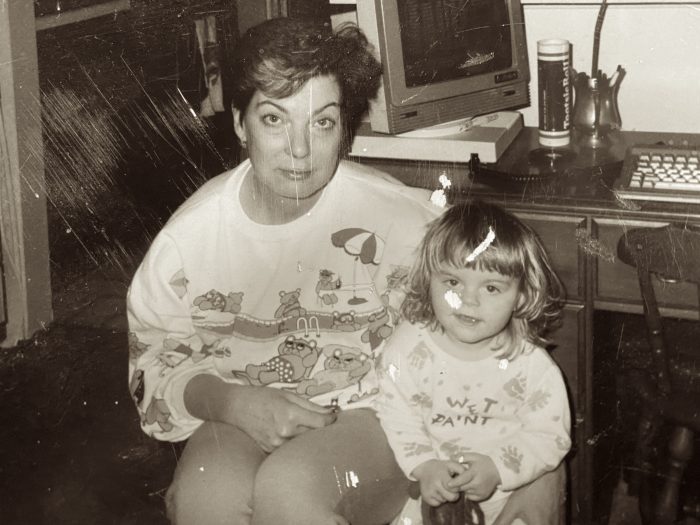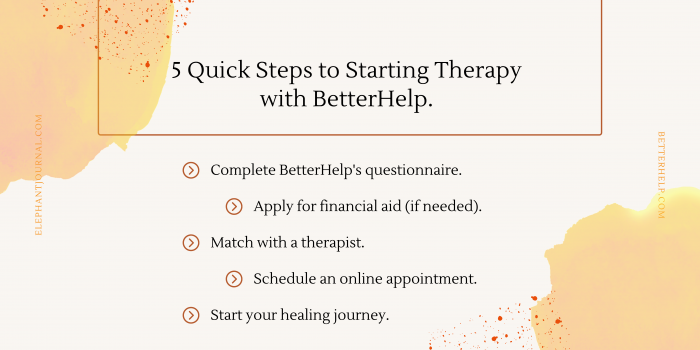This article is written in partnership with BetterHelp.com. They’re dedicated to helping folks get easier, more affordable access to mental healthcare, and we’re proud to work with them. ~ ed.
My heart rate skyrockets and adrenaline crawls up my chest like a swarm of fire ants leaving visible welts that itch and burn.
I’ve made a mistake. I can’t think of how to pull myself together.
My brain, like a computer, opens folders full of files of mistakes that I’ve made in the past, sending my processing system into a slow-motion crawl.
“They all add up,” my inner voice says. “They’re going to fire me. This is it.”
The slope is steep and before I know it, I’m slipping down into a version of my life where I’m claiming bankruptcy, can’t pay my bills, and nothing good happens—ever.
The anxiety has been unbearable. A constant pain has been sitting on the left side of my chest for months—years, even.
The mistake I made? Tinier than the period at the end of this sentence—literally.
I’m self-aware enough to know what’s going on here. I’m triggered. Words like belonging, livelihood, and survival all flash through my mind in these moments, telling me that this idea that I need to be perfect is tied to all of them.
But mindful and aware as I can be, I lack the defragmenting system to help re-arrange those erratic files into a pattern that will allow me to function better. And without it, I’m stuck reliving this same damn pattern from day to day, department to department, job to job.
I’ve needed help for some time. And it turns out I’m not alone.
Anxious much? Take a deep breath & let BetterHelp take some of that weight off your chest. >>
Nearly 51.5 million U.S. adults live with mental illness (1).
That’s one in five Americans who struggle with their minds.
Despite the dire need, 24.7% of American adults with a mental illness reported an unmet need for treatment in 2019—a statistic that has risen every year since 2011 due in part to lack of access to mental health services, particularly nonexistent or inadequate health insurance. (4)
There’s a better way to access mental health.
Now, in my personal experience, so many things have to align to support both a willingness and ability to receive help.
My salary may say I’m not low income, but when accounting for student loan debt and some physical health needs, along with many others like me in similar or worse circumstances, mental help often comes up at the bottom of the list.
So when BetterHelp, an app that connects mental health professionals with folks who are in need of psychological services, reached out to Elephant to work on a themed month aimed at raising mental health awareness during the ensuing colder months (hello SAD) and hectic holiday season, you bet I raised my hand high, jumped up and down, and said, “Me, me, me! I’ll write the article! I’ll do it! Pick me! Please!”
I’d actually just taken their online questionnaire by my own volition and looked into their flexible, affordable mental health care the week before we partnered with them and was already trying to find ways to make a little more financial room to take the plunge.
The Good, the “Bad,” and the Ugly of BetterHelp Therapy
Therapy can be a scary thing, and it’s important to know what lies ahead when we decide to take the first steps toward healing our wounds. So here are a few take-aways from my experience with BetterHelp in case you should decide to check them out.
The Good
After only a few weeks of service, the therapeutic takeaways have been thoughtful, plentiful, and enlightening. And that’s probably how it should be—particularly when you are as backed up with as many mental health concerns as I am.
With some personal awareness and my open book nature, we were able to get to one of the root causes of a lot of my concerns by the end of my first session. By my fourth, I was given words or phrases that name some of my frequent behaviors—an odd comfort in itself.
“Anticipatory anxiety,” for example, made my brand of anxiety feel common enough to have a term, and reduced some of the emotional charge I attach to even just experiencing such a thing on a regular basis.
That stupid fear of getting fired over that period-sized mistake and then going bankrupt? That’s “catastrophizing.” Nice to have a name for the awful culprit!
Beyond that:
>> Scheduling therapy sessions and showing up for them has never been easier. It feels more like booking a yoga class at my favorite studio than a doctor’s appointment.
>> I can message my therapist at the click of a button without worrying that I’m a burden.
>> I can click into “homework” links and resources and do them right there on my phone.
>> I can access BetterHelp’s journal from anywhere, any time, and guide myself to an awareness of what I might like to look at during my next session.
This type of ease in accessibility just might be why 94% of BetterHelp users prefer it to face-to-face therapy (6).
Therapy from the comfort of your own damn couch, thankyouverymuch! >>
The “Bad” (feat. Goldilocks & the Four Bear[ers] of Therapy)
The right therapist isn’t necessarily easy to find.
In the end, this was the most challenging thing about my BetterHelp experience, and it actually is something easily viewed as a positive.
I’d be lying if I said I wasn’t a little panicked and frustrated when my third attempt at pairing with a therapist wasn’t a fit. I felt like a misfit and like no one was going to be able to help me—and when it comes to mental health, that’s an important obstacle to acknowledge if we’re prone to overwhelm, so I’ll place it here.
And at the end of the day, we know how hard it is to find a symbiotic match for anything in life, whether it be dating, a yoga instructor, a life coach, and the list goes on. But if we can anticipate a little difficulty, perhaps we can be more resilient in pushing through to do what we know will be better for ourselves in the end.
That said, my journey to finding a good match was a bit like Goldilocks:
The first therapist I was paired with wasn’t in the right location. I was moving just days after I signed up for services and it wouldn’t be legal to provide me with care when I wasn’t going to be a resident where she was registered.
The second therapist I reached out to highlighted the trending mental health issue of limited availability. I was discouraged when I learned that a therapist who sounded like a good fit had no availability for new clients, but I kept trucking on.
My third therapist was just not a fit, but he did offer some truly helpful insights, a great sense of humor, and encouragement on my way to finding the kind of help that would best suit me.
My fourth therapist is just right.
The beauty of it all? There was an abundance of options for me to consider and reach out to each step of the way. The form I’d filled out to populate my profile provided all my prospective therapists with the same information, and based on what I’d learned from the last encounters, I was able to fine-tune the specifics of what I want to handle in therapy, and what I wanted in a therapist.
And the process to switch was fast enough that all of that occurred within 3 weeks’ time—that’s a big plus in the hard times when we need help the most.
When the letting go of childhood wounds gets tough, it’s time for BetterHelp. >>
The Ugly (Cries)
Okay, so we’re not actually there yet, and that’s totally fine. It’s healthy to build trust steadily over time, after all.
I’m more at the, “Well, f*ck” place in therapy where it feels like a therapist pulls back a curtain and—wham!—there are your demons.
In all seriousness, there have been some throat-tightening moments that have definitely started me off on the right foot when it comes to therapy.
One major win that I’m positive will eventually lead to the consumption of tissues? It turns out that those behaviors I described earlier—that whole slew of tendencies and thoughts—all roll into a burrito supreme of symptoms commonly experienced by someone who was either raised in a dysfunctional family or is an adult child of an alcoholic (ACOA).
All this time, I’ve felt so very alone, when there are actually an estimated 76 million people just like me (and maybe you, too) who either have lived or are currently living with a family history of alcoholism (5). And BetterHelp is here to assist us.
Discovering the Adult Child of an Alcoholic within us
The ACOA label is one that I’d been given by a therapist as an angsty teen avoiding acknowledging that my mother’s and grandmother’s alcoholism had a painful impact on my life.
I’d tucked it away in the back of my mind all those years ago thinking that I could make it all go away if I were just mature enough, strong enough—mechanisms of my upbringing that both my therapists were quick to point out, but that I have been unaware of or unwilling to face all these years.
Until we reach out for help, we’re likely to suffer from these trauma symptoms that hide in plain sight:
Any of these sound familiar?
Hypervigilance: We are frequently hyper-vigilant in our family and work environments, and relationships. This is a self-protective coping mechanism that stems from the emotional or physical pain we’ve experienced in our childhood.
Need for control: We grew up in a world without control, which led us to focus on controlling our behavior and the behavior of those around us. This often manifests as relationship trouble with intimate partners as we try to control all aspects of the relationship.
Difficulty with emotions: We might have learned to hide our emotions—particularly “negative” ones like sadness, anger, embarrassment, frustration, or shame. This can result in the inability to express positive emotions, even to a child or a partner. Neutrality means we can’t get hurt.
Low self-esteem: We have a low sense of self-esteem and are often uncomfortable with recognition or praise, although it is also what we seek. We can be very sensitive to any type of criticism or perceived negative feedback.
Physical and mental health issues: As with any type of trauma or stress, we are prone to poor self-care routines, isolation, and a higher risk of depression, which continues a pretty nasty cycle.
It’s all so loaded. And heavy. And you know what? This time, I’m ready to look at it. The change is going to be delicious. I can already tell.
I’m not gonna solve it all in a few weeks of therapy, though. It’s gonna take some time to get tools and rewire my neurological patterns.
Session by session, worksheet by worksheet, journal entry by journal entry, we’ll uncover the root thoughts that lead to the emotional reaction—the anxiety that pops up as a response to perceived threats to my survival. We’ll tackle the perfectionism and the need to control my relationships for fear of abandonment. We’ll arm wrestle with the caretaker role I played throughout my childhood.
We’ll use the tools I’ve added to my toolbox to start disassembling the pillow cushion fortress that guards my inner child and let her know it’s time to come out and play—to access that joy she has so long kept locked away in an effort to be responsible and “good” and “well behaved.”
And because of BetterHelp’s more affordable pricing (most therapy costs about $95 per session, recommended at one session per week) and even lower pricing options for truly low-income individuals, I’m a lot more likely to be able to continue on once I’m done receiving help through our partnership.
It’s time to invest in my own damn self.
Get get by with a little help from our friends: Better days are ahead with BetterHelp. >>
~
Resources:
(1) https://www.nimh.nih.gov/health/statistics/mental-illness
(2) https://www.theguardian.com/society/2019/jun/03/mental-illness-is-there-really-a-global-epidemic
(3) https://www.ncbi.nlm.nih.gov/pmc/articles/PMC6227754/pdf/main.pdf
(4) https://mhanational.org/issues/state-mental-health-america
(5) https://www.psychologytoday.com/us/blog/addiction-and-recovery/201908/trauma-symptoms-adult-children-alcoholics
(6) https://www.ncbi.nlm.nih.gov/pmc/articles/PMC6364202/




Read 12 comments and reply